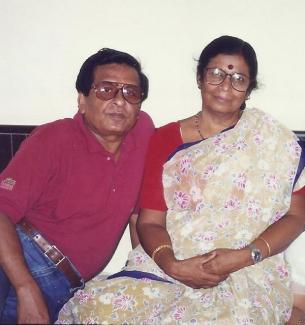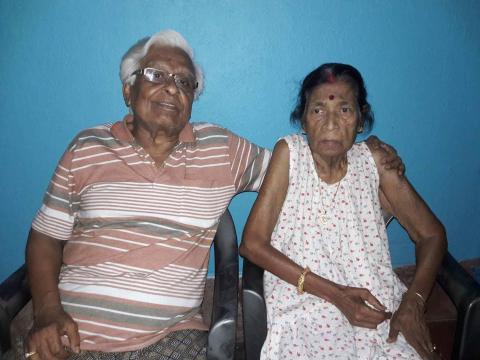
Dr (Prof) Nandi, 83 is a full time caregiver for his wife, Dr Gita Nandi, who has been diagnosed with Alzheimer’s. He shares his experience of a caregiver in this personal account.
My wife is a doctor herself and she has been suffering from Alzheimer’s for the last six and a half years. The first symptoms were that she started having breathing trouble. I admitted her to the Railway Hospital. She used to be a senior doctor with the Railways and we also used to live in the Railway quarters in Kolkata. She was kept there for 15 days under medication. She was then taken in for an MRI which revealed her condition. She was then referred to a consultant psychiatrist. For the next 2 years, there was no visible improvement at all.

Is there a history of Alzheimer’s in the family?
There is no history of Alzheimer’s in the family.
What is the present condition?
The present condition, surprisingly, is actually better. After a long time, she is trying to talk and even walk by herself. Previously she would just lie down and do nothing. Now, she is actually trying to get up and do chores like brushing her teeth. Earlier she would get irritated if anyone tried to do something for her. I know Alzheimer’s is not curable. But these are very positive signs. The doctor we consult now is a neuro physician at Apollo and he has said that this could be a temporary improvement phase. But we should try and see that she does not become a bedridden person. We try to make her get up and move around a little, not that she likes it always.
Please describe your experience of managing the patient.
I have naturally had to manage the situation as well as my wife, since I am the only able bodied person around. We do not have any children.
I had previously kept an attendant for my wife, but I have seen that they misbehave with her, and even physically abuse her. I felt very bad having witnessed it. So now I do everything myself. There is someone who is almost like a family member, who also helps me out. But now I don’t feel bad about taking care of my wife.
Do you feel there is a stigma attached to Alzheimer's? If so, how did you deal with it?
There could be a stigma attached, but I have never faced any. Nor have I treated my wife any differently. In fact, to tell people that it is not a contagious disease, I often have the water from the same cup my wife uses.
What were some of the challenges you faced and what is your advice to caregivers who face similar challenges?
The biggest challenge in my caregiving is that I have to be constantly alert for my wife. Most of the times she likes to be in bed. The rest of the time, if she is trying to move around or sitting somewhere, I always have to be alert about what she needs. And that is an important tip for any caregiver for a condition like Alzheimer’s.
Since you were not a trained person yourself, how did you manage?
I learnt on the job. There was a time when I used to take my wife to the ARDSI day care centre where I would spend the whole day. I would observe how she would be taken care of there. So I picked up the ropes from there. For the rest, I used my own intuition.
Have you learnt anything in being a caregiver that you wish you knew before?
Not really. But I have realised over time that it is very important to understand the behavior of the patient. I don’t have any work. Caring for my wife is my only job. But at the same time, it is disturbing when she slaps or hits or even tries to bite. These reactions usually take place when she is unwilling to do something and is being asked to walk or eat when she does not want to. These are some of the challenges of caregiving that I have faced.
How has this been a learning process and what changes have you had to make to your lifestyle because of this?
Naturally it has been a huge learning process. For being a caregiver, I have also had to make a few sacrifices. I have been involved in politics at the local level, which I had to completely give up after my wife was diagnosed with this condition. Being a professor of biology, I have written a lot of books on life science and biology for different academic sessions and for reputed publishers. I have given all that up as well. But I have no regrets because I have to look after my wife.
Has it been difficult emotionally to cope with your condition?
I have accepted the fact that I am the only caregiver for my wife, as we have no children. Therefore, it has not been a hugely emotional issue for me.
How much support did you get from your family and friends?
I have always got a lot of support from my family. We are 8 brothers, and we all live close to each other. In fact, even when I had the opportunity of building a house elsewhere, I did not do that. It is good that we can all live in close proximity. It gives me a lot of mental strength. Though I do worry that if my wife survives me, who is going to look after her.
What was the hardest part of being a caregiver?
The hardest part of being a caregiver has been to adjust to my wife’s mood swings and erratic behavior. Even if I do not want to go to a particular place or do something that she wants me to do, I have been compelled to do it as I cannot go against her moods. That has sometimes been a little irritating.
How do you take a break and recharge yourself?
Strange as it may sound, I love signing in to Facebook and chatting up with my Facebook friends, who are mostly my students. That is definitely a big release and a fun area for me. I used to listen to music before, but don’t do it much now as my gramophones etc don’t work any more.
Personal narrative courtesy ARDSI Kolkata






